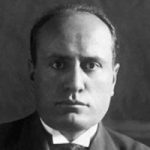
Mussolini was born into a middle-class family and showed an early interest in politics. In his youth, he embraced socialist ideas and became an active socialist agitator. However, his views evolved over time, leading him to form his own political ideology, which would later be known as fascism. Mussolini founded the Fascist Party in 1919, capitalizing on post-World War I social unrest and economic instability.
During the 1920s, Mussolini capitalized on widespread disillusionment with Italy’s political establishment. In 1922, he orchestrated the March on Rome, a mass demonstration that led to King Victor Emmanuel III appointing him Prime Minister. Mussolini consolidated power by dismantling democratic institutions, suppressing political opposition, and establishing a one-party state.
Under Mussolini’s leadership, Italy experienced a period of intense nationalism and state control. He sought to revive the glory of the Roman Empire, emphasizing imperialistic ambitions. Mussolini implemented various policies, including strict censorship, propaganda, and the indoctrination of Italian citizens into fascist ideology. He aimed to create a disciplined society governed by a cult of personality centered around himself.
Mussolini’s foreign policy was characterized by territorial expansion and alignment with Nazi Germany. In 1936, he supported General Francisco Franco in the Spanish Civil War, cementing the relationship between Italy and Germany. Mussolini’s most notable military endeavor was his invasion of Ethiopia in 1935, an act that drew international condemnation. In 1940, he declared war on France and the United Kingdom, siding with Hitler’s Axis Powers in World War II.
As the war progressed, Mussolini’s leadership faltered. Italy faced military defeats and economic turmoil, leading to widespread discontent. In 1943, the Allies invaded Italy, and Mussolini was arrested by his own people. However, he was subsequently rescued by German forces and installed as the head of the Italian Social Republic, a puppet state in Northern Italy. Eventually, as Germany’s defeat seemed inevitable, Mussolini attempted to flee but was captured by Italian partisans. On April 28, 1945, he was executed by firing squad, and his body was displayed in public.Benito Mussolini’s legacy remains controversial. While he initially implemented some policies that were viewed as beneficial, such as infrastructure projects and social welfare programs, his brutal regime and alliance with Hitler stain his record. Mussolini’s fascism led to the suppression of individual freedoms, the persecution of minority groups, and disastrous military ventures. The fall of Fascist Italy serves as a reminder of the dangers of totalitarianism and the devastating consequences of unchecked authoritarian power.Benito Mussolini’s life was a journey from socialist agitator to fascist dictator. Although he initially garnered support by promising to restore order and national pride, his regime ultimately led Italy down a path of destruction. Mussolini’s actions and decisions left an indelible mark on history, highlighting the dangers of extremist ideologies and the importance of safeguarding democracy and human rights



















Add Comment